Articles
- Page Path
- HOME > Korean J Community Nutr > Volume 23(4); 2018 > Article
-
Research Article
- Consumption Behaviors of Energy Drinks and Comparison of Associated Factors Among College Students in Gwangju
-
DaWun Seo, Bok Hee Kim

-
Korean Journal of Community Nutrition 2018;23(4):289-301.
DOI: https://doi.org/10.5720/kjcn.2018.23.4.289
Published online: August 31, 2018
Department of Food and Nutrition, Chosun University, Gwangju, Korea.
- Corresponding author: Bok Hee Kim. Department of Food and Nutrition, Chosun University, 309 Pilmun-daero, Dong-gu, Gwangju 61452, Korea. Tel: (062) 230-7721, Fax: (062) 225-7726, kimbh@chosun.ac.kr
Copyright © 2018 The Korean Society of Community Nutrition
This is an Open-Access article distributed under the terms of the Creative Commons Attribution Non-Commercial License (http://creativecommons.org/licenses/by-nc/3.0/) which permits unrestricted non-commercial use, distribution, and reproduction in any medium, provided the original work is properly cited.
- 1,355 Views
- 15 Download
- 3 Crossref
Abstract
-
Objectives
- The aim of this study was to examine the current status of consumption of energy drinks among college students and investigate the effects of general environmental factors, health behavior factors, caffeine knowledge levels, and perceived stress levels on consumption of energy drinks.
-
Methods
- A survey was conducted among a total of 479 college students in Gwangju, using self-administered questionnaires. The questionnaire consisted of items about general environmental factors, health behavior, caffeine knowledge, perceived stress, and energy drink consumption behaviors.
-
Results
- 69.1% of participants experienced consumption of energy drinks, and specifically 82.8% of male students and 54.1% of female students experienced consumption of energy drinks (p<0.001). The reasons for drinking energy drinks were found to be recovery from fatigue, curiosity, taste, habit, thirst relief, and stress relief. In addition, 40.7% of participants experienced drinking energy drinks mixed with alcohol, and specifically 48.6% of male students and 27.4% of female students reported drinking energy drinks with alcohol (p<0.001). Moreover, 51.5% of participants responded that they experienced the effects of energy drinks, 31.9% reported experiencing adverse effects, and 41.1% were found to perceive the health risks. As a result of the assessment of caffeine knowledge, the participants showed a high level of knowledge of the arousal effect (77.7%) and the concentration increasing effect (70.8%) of caffeine, whereas they exhibited a low level of understanding of the health problems due to caffeine (32.6%) and adequate caffeine intake levels (24.4%). The higher levels of consumption experience of energy drinks was associated with higher body mass indexes (BMI) (p<0.01), higher academic years (p<0.01), lower levels of interest in health (p<0.05), smoking (p<0.001), alcohol consumption (p<0.05), and higher levels of perceived stress (p<0.05).
-
Conclusions
- The risk groups related to consumption of energy drinks among college students were identified as male students rather than female students, students in the third or fourth year of study associated with increased stress levels, and students with negative health behaviors. Therefore, support for diverse health and nutrition education for college students is required along with the improvement of internal and external environments of schools in order for college students to manage increased stress levels due to the schoolwork and preparation for employment and maintain positive health behaviors.
Acknowledgments
Acknowledgments
- 1. Heckman MA, Sherry K, de Mejia EG. Energy drinks: an assessment of their market size, consumer demographics, ingredient profile, functionality, and regulations in the United States. Compr Rev Food Sci Food Saf 2010; 9(3): 303-317.ArticlePubMed
- 2. Consumer Injury Surveillance System. A survey on the safety of energy drinks [internet]. 2013; updated 2013 Nov 15]. cited 2018 Jun 15]. Available from: https://www.ciss.go.kr/www/selectBbsNttPrductView.do?key=101&pKnd=PRDUCT01&bKnd=ndata&nttNo=3191.
- 3. Lee YM. Energy drinks, emerged as a new blue ocean [internet]. Next economy; 2010; updated 2010 Aug 24]. cited 2018 Jun 15]. Available from: http://www.nexteconomy.co.kr/news/articleView.html?idxno=6208.
- 4. Choi R, Park JK. The effects of a short-term cognitive restructuring training to improve stress response and dysfunctional attitude in undergraduate students in Korea. Cognitive Behav Ther Korea 2010; 10(2): 27-42.
- 5. Yoon SY, Choi YH, Kang JA, Kwak MK, Woo SJ, Lee YN. Relationship between intake of energy drinks and sleep quality among female university students. Ewha J Nurs Sci 2013; 47: 81-96.
- 6. Lee J, Huh W, Choi EJ. Pattern analysis of high-caffeine energy drink consumption and adverse effects among college students in a university. Yakhak Hoeji 2013; 57(2): 110-118.
- 7. Park JS, Lee EJ, Lee CY, Jung HS. Consumption status, risk awareness and experience of adverse effects of high-caffeine energy drink among university students. J Korean Public Health Nurs 2015; 29(1): 102-114.Article
- 8. Lee SJ, Kim HJ, Kim MR. Analysis on intake of energy drinks of high school students in Gyeoungbuk region. J East Asian Soc Diet Life 2014; 24(6): 924-932.Article
- 9. Ministry of Food and Drug Safety, Korea Health Industry Development Institute. Study for research on the actual condition and improvement labelling system about caffeine. 1st ed. Seoul: Ministry of Food and Drug Safety; 2003. p. 34-48.
- 10. Kang MJ. A survey on the perception and intake of caffeinated beverage among high school students in Jeju [master's thesis]. Jeju University; 2015.
- 11. Lee BH, Park YS, Kim JS, Yoo JH, Lee JK. Caffeine consumption and its related symptoms in university students. Korean J Fam Med 2007; 28(1): 9-16.
- 12. Jung ES, Park HJ. Effects on stress degree, study attitude, sleeping hours by intake degree of caffeinated drinks. J Digit Converg 2014; 12(2): 353-361.Article
- 13. Kim SH. Intake patterns and perception of caffeinated beverage among middle school students [master's thesis]. Inha University; 2015.
- 14. Lee EN, Kim HJ, Lim JY, Kim JA, Park HY, Lyu JY. Survey of caffeine levels in the favorite diets of children. J Food Hyg Saf 2007; 22(3): 173-178.
- 15. Yun HS, Kim SH, Lee CY. An analysis of factors affecting energy drink consumption in college students. J Korean Soc Health Educ Promot 2013; 30(3): 1-12.Article
- 16. Ju HH, Ly SY. Daily intake levels for caffein from adolescence''s favorite beverage at Daejeon area. Proceedings of 2013 Summer Symposium of Korean Living Science Association; 2013 May 31; Daejeon. p. 214.
- 17. Kim SY. Correlation between caffeine intake level and perceived stress in high school students in Yongin region. J Korean Soc Food Sci Nutr 2018; 47(2): 176-185.Article
- 18. Lee SJ, Kim HC, Kim MR. Study on recognition knowledge, and intake behavior of foods containing caffeine of high school students in Gyeongbuk region. J Korean Home Econ Educ Assoc 2014; 26(4): 21-34.
- 19. Kim SH. Energy drinks risk taking more than twice a day [internet]. 2016; updated 2016 Feb 5]. cited 2018 Jun 15]. Available from: http://www.mdtoday.co.kr/mdtoday/index.html?no =264630.
- 20. Moon JY, Kim SW, Lee KE, Gwak HS. Correlation between aggression and health behaviors of Korean high school students. Korean J Clin Pharm 2014; 24(2): 144-153.
- 21. Lee CH, La SA. Energy drinks addiction and policy development: focusing on consumption patterns of teenagers and university students. Serv Mark J 2014; 7(1): 29-43.
- 22. Ministry of Food and Drug Safety. Sate level of caffeine intake in Korea- Result of caffeine intake evaluation [Internet]. 2015; updated 2015 Jun 30]. cited 2018 Jun 15]. Available from: http://www.mfds.go.kr/brd/m_99/view.do?seq=28091.
- 23. Yoo HS, Sim KH. Survey on the high-caffeine energy drink consumption status of university students in Seoul. J East Asian Soc Diet Life 2014; 24(3): 407-420.Article
- 24. Choi R, Park JK. The effects of a short-term cognitive restructuring training to improve stress response and dysfunctional attitude in undergraduate students in Korea. Cognitive Behav Ther Korea 2010; 10(2): 27-42.
- 25. Korean Dietetic Association. Manual of medical nutrition therapy. 3rd ed. Seoul: Korean Dietetic Association; 2008. p. 247.
- 26. Park JH, Lee JW, Kim BR, Yoon SH, Lee D, Han JA, et al. A study on the actual energy drinks and the recognition of energy drinks in Seoul and Gyeonggi area. Proceedings of Spring Conference of J East Asian Soc Diet Life; 2015 May 9; Seoul. 218.
- 27. Moon HK. A study on the consumption patterns of functional beverages of high school students and university students in Daegu metropolitan city [master's thesis]. Yeungnam University; 2013.
- 28. Park SH, Lee SH, Chang KJ. Intake-related factors and educational needs regarding energy drinks in female high school students in the Incheon area. J Nutr Health 2017; 50(5): 460-471.ArticlePDF
- 29. Kim TY, Kim SM, Kim JY, Im JY, Yu H, Han YH. Awareness and consumption of energy drinks and associated factors among college students in Cheongju. Korean J Community Nutr 2018; 23(1): 60-72.ArticlePDF
REFERENCES
Figure & Data
REFERENCES
Citations

- Analysis of Caffeine Intake and Eating Disorders among College Students according to Whether an Examination was Imminent or Not
Eun-Ji Lee, Bok-Mi Jung
The Korean Journal of Community Living Science.2023; 34(1): 47. CrossRef - 광주광역시 지역민의 영양교육 요구도 조사 분석
은평 양, 경윤 김, 승희 최, 금비 류, 옥경 김, 정미 윤
Korean Journal of Food and Cookery Science.2023; 39(2): 100. CrossRef - A Study on the Perception and Intake of Caffeinated Beverages in Adults Aged 20 to 30 Years
Bo-Ra Seo, Sim-Yeol Lee
Journal of the East Asian Society of Dietary Life.2023; 33(6): 545. CrossRef
General characteristics of the subjects
1) Mean ± SD
2) BMI (Body Mass Index)
3) N (%)
*: p<0.05, **: p<0.01, ***: p<0.001 significantly different by t or χ2 test
Health related characteristics of the subjects
1) N (%)
*: p<0.05, **: p<0.01, ***: p<0.001 significantly different by χ2-test
Stress awareness and score of the subjects
1) Mean ± SD
*: p<0.05, **: p<0.01, ***: p<0.001 significantly different by t-test
2) Sum of stress scores: min 20 – max 100
Energy drink consumption behaviors of the subjects
1) N (%)
*: p<0.05, **: p<0.01, ***: p<0.001 significantly different by χ2-test
Experience effects and adverse effects of energy drink in the subjects
1) N (%)
*: p<0.05, **: p<0.01, ***: p<0.001 significantly different by χ2-test
Caffeine knowledge of the subjects
1) N (%)
2) Sum of caffeine knowledge: min 0 – max 9.
3) Mean ± SD
*: p<0.05, **: p<0.01, ***: p<0.001 significantly different by χ2-test
General & health related characteristics between energy drink users and non-users
1) N (%)
*: p<0.05, **: p<0.01, ***: p<0.001 significantly different by χ2-test
Stress types and score between energy drink users and non-users
1) N (%)
*: p<0.05 significantly different by χ2-test
1) Mean ± SD 2) BMI (Body Mass Index) 3) N (%) *: p<0.05, **: p<0.01, ***: p<0.001 significantly different by t or χ2 test
1) N (%) *: p<0.05, **: p<0.01, ***: p<0.001 significantly different by χ2-test
1) Mean ± SD *: p<0.05, **: p<0.01, ***: p<0.001 significantly different by t-test 2) Sum of stress scores: min 20 – max 100
1) N (%) *: p<0.05, **: p<0.01, ***: p<0.001 significantly different by χ2-test
1) N (%) *: p<0.05, **: p<0.01, ***: p<0.001 significantly different by χ2-test
1) N (%) 2) Sum of caffeine knowledge: min 0 – max 9. 3) Mean ± SD *: p<0.05, **: p<0.01, ***: p<0.001 significantly different by χ2-test
1) N (%) *: p<0.05, **: p<0.01, ***: p<0.001 significantly different by χ2-test
1) N (%) *: p<0.05 significantly different by χ2-test

 KSCN
KSCN
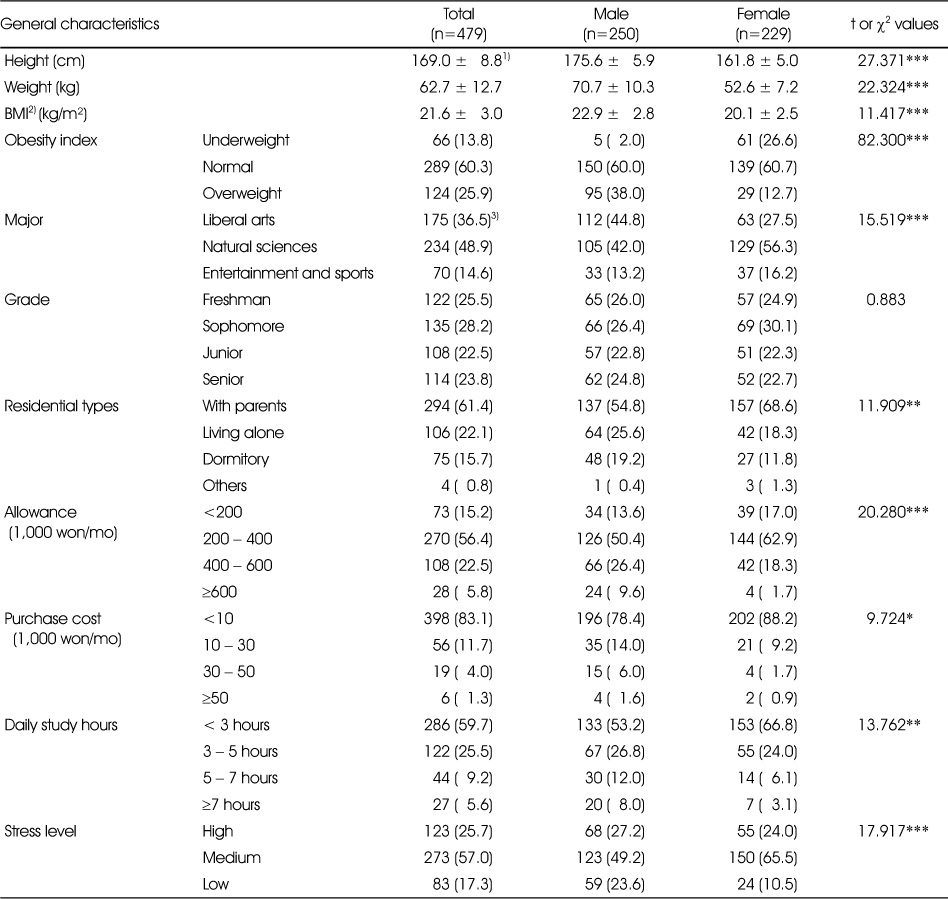
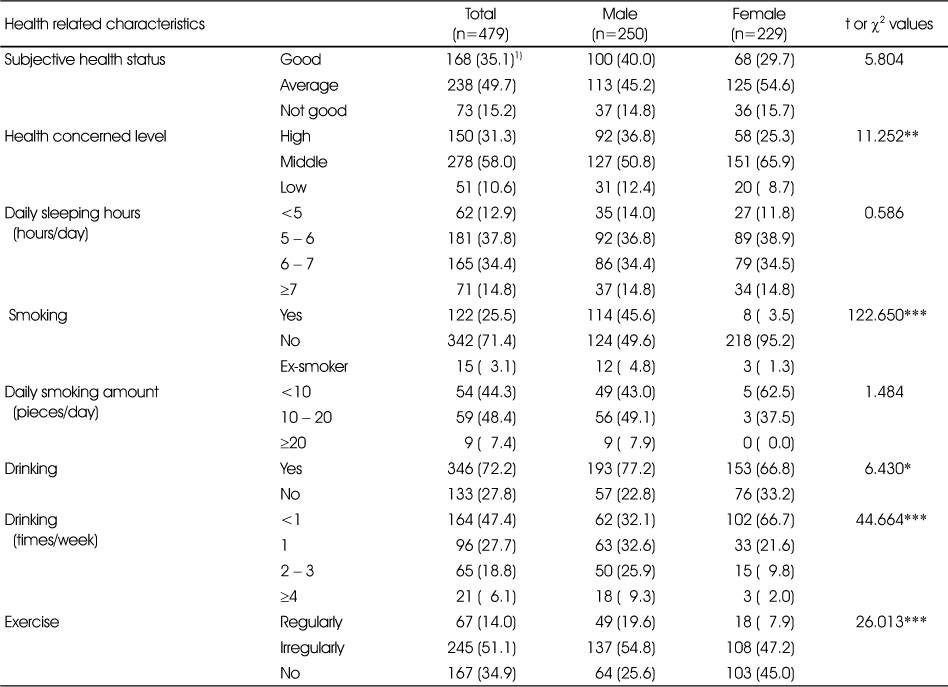
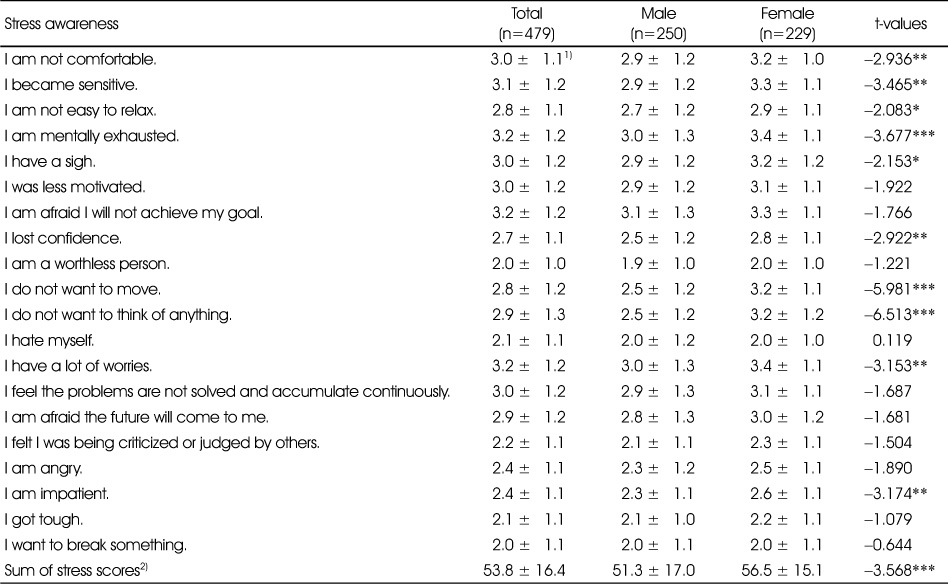
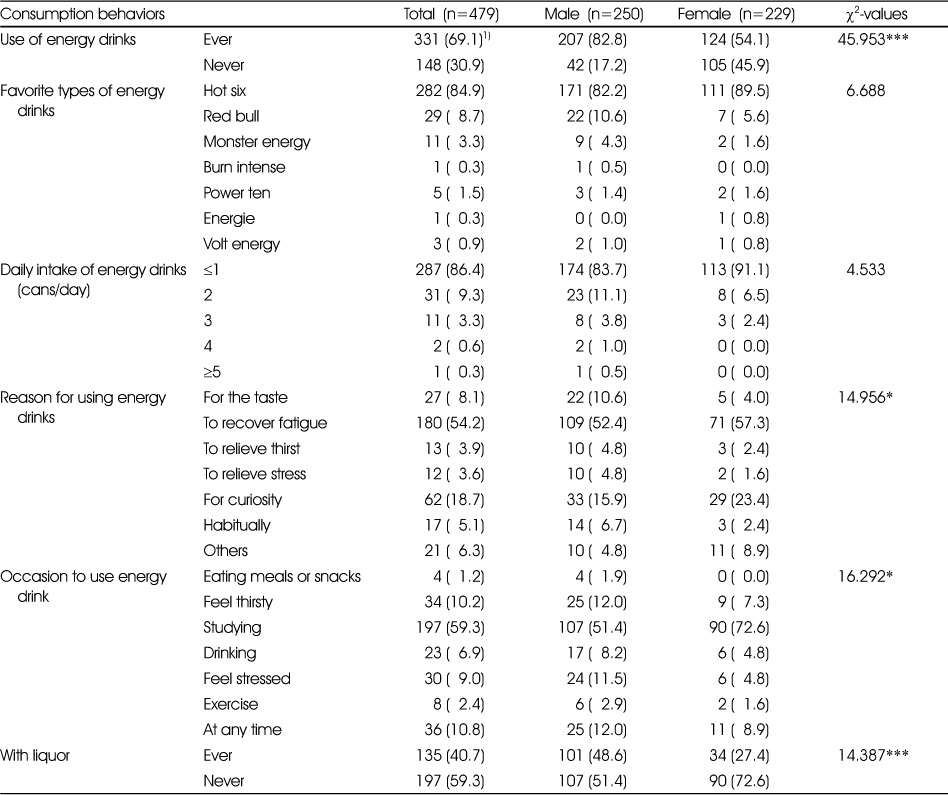
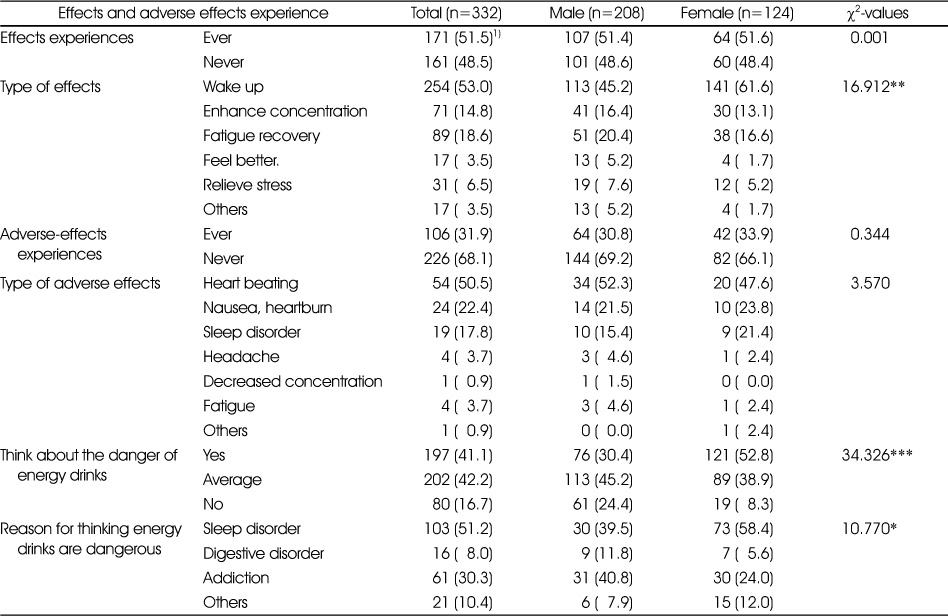

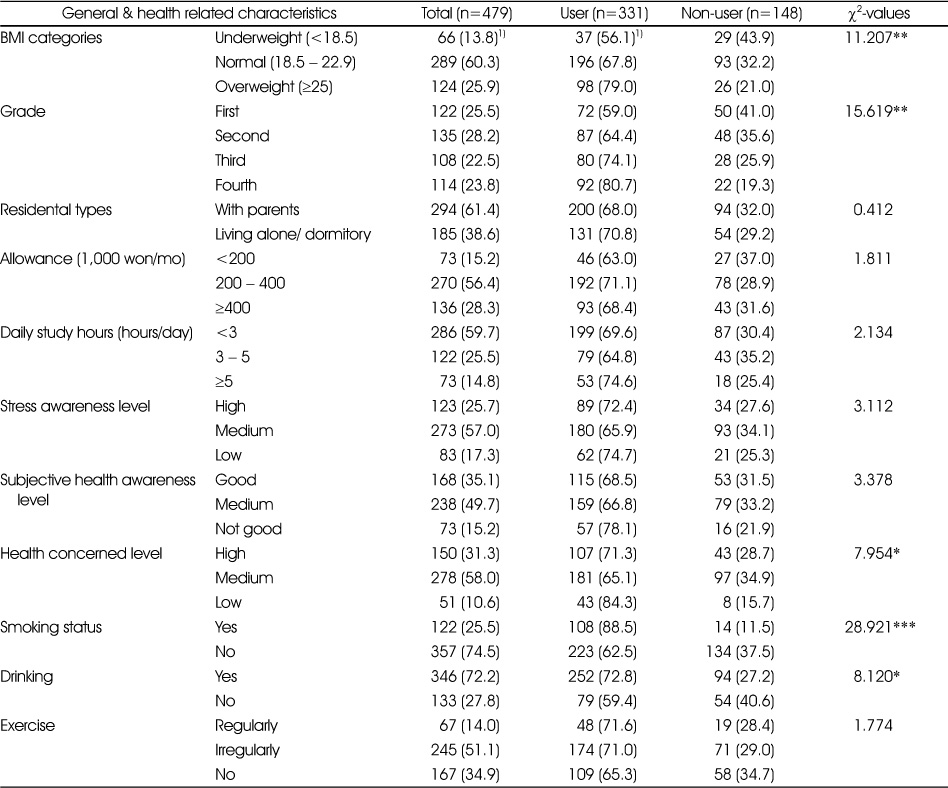

 Cite
Cite


